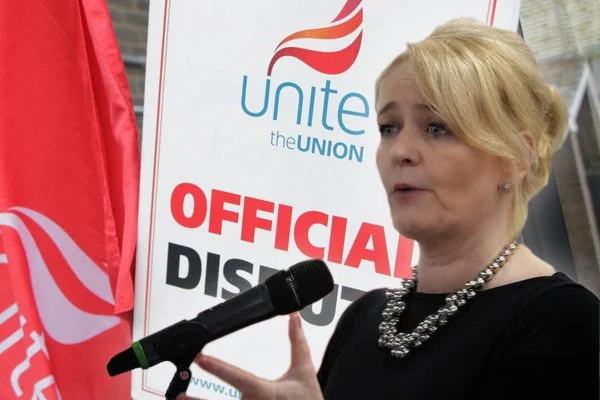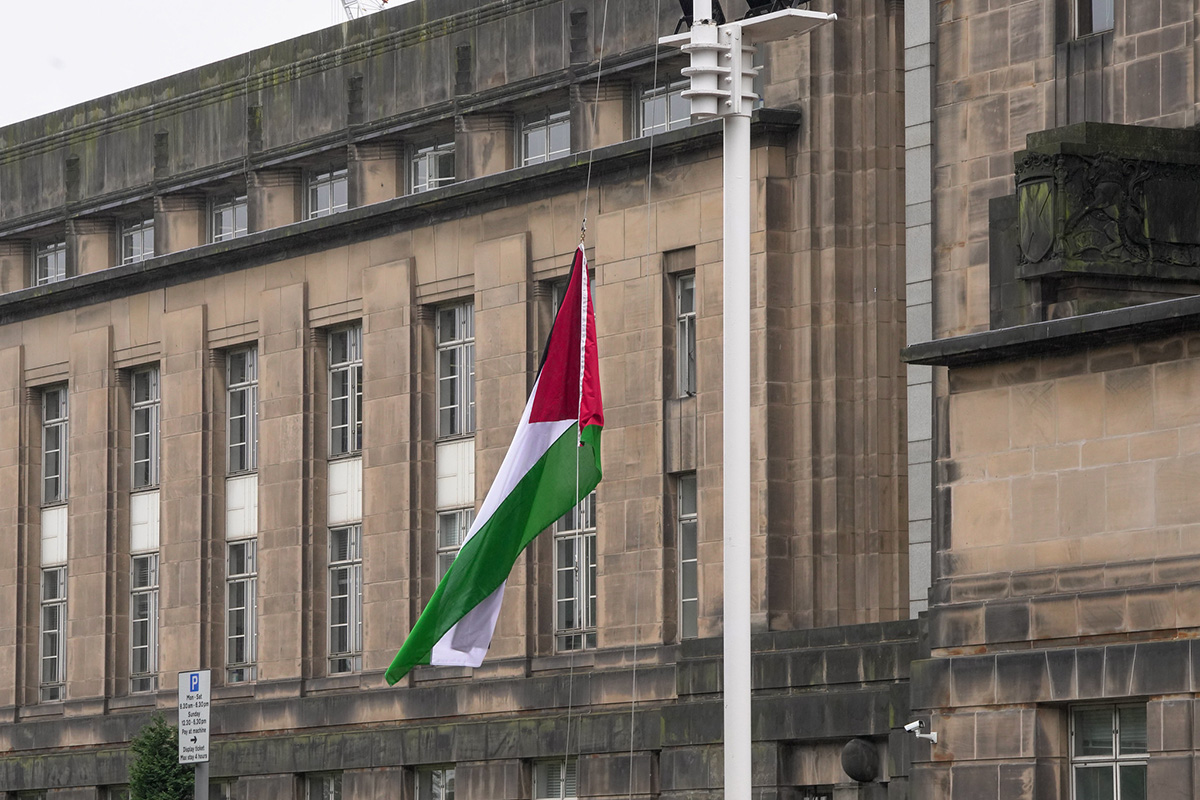In the coming weeks, workers organised in Unite at defence giant BAE Systems – Britain’s largest arms manufacturer – are escalating their strike action at two Lancashire sites.
Following a failed court injunction by BAE, further walkouts are planned between 26 November and 17 December, in protest against the bosses’ paltry pay offer of 3.6 percent.
This below-inflation offer stands in sharp contrast to BAE Systems’ profiteering. Unite says that the company’s profits rose from £2.7 billion to £3 billion from 2023-24 – the bosses’ gold no doubt soaked in the blood of thousands of Palestinian children.
“We respect the right of employees to engage in industrial action,” BAE bosses claimed, “and remain committed to a partnership approach with all our trade union groups.”
But this “respect” rings a little hollow. This mealy-mouthed statement immediately followed an unsuccessful plea to the High Court to declare the strike unlawful!
Bourgeois judges are no friends of the workers’ movement. Nevertheless, they clearly thought that such a repressive measure would be inflammatory.
Unite general secretary Sharon Graham spoke plainly on the matter. “This disgusting behaviour is strike busting, plain and simple. And Unite will not tolerate it.”
Unity is strength
The strikers’ continued industrial action – standing firm in the face of the bosses’ manoeuvres – should be applauded.
Similarly, the joint action planned between different parts of the plants is certainly a step forward. Traditionally, strikes in this sector have been based on specific roles, such as engineers, electricians, etc.

Unfortunately, however, there appears to be some big inconsistencies between the leaders’ fiery speeches and their actions.
Unite organises 5,000 of the 12,000 workers at these two sites. These thousands of workers voted overwhelmingly for strike action in the ballot. Regional organiser Ross Quinn, meanwhile, talked of “bringing two major factories to a standstill”.
The union, however, only called out 400 workers for action taken earlier this month. And Unite’s own press release suggests that only “a select group of workers are taking further strike action” in the weeks ahead.
It might well be that this is part of a conscious strategy: bringing out one section after another to paralyse the factory as part of a staggered strike; or targeting specific parts of the factory, without all workers having to lose pay.
But if this move is strategic, then we must say that it is being executed rather opaquely. And besides, it does not appear to be working.
Unite’s statements suggest that such a strategy is being followed. Back in September, the union explained that they were looking “to ballot specific groups of workers who will see a number of defence programmes grind to a halt on the factory floor” (our emphasis).
This strategy may sound smart: perhaps workers will be more inspired to take action if they will not lose so much pay. In reality, however, this argument is misguided. Generally speaking, bringing out one section of the workforce at a time is a risky approach.
It is a well-known maxim in the trade union movement that “unity is strength”. The effect on production of all workers coming out collectively is far greater than the total impact of workers downing tools individually, one after another.
This goes for the morale of the strikers as well. The greater the mass that takes part in action, the greater its gravitational pull. 5,000 workers standing at the two factory gates in defiance of the bosses would truly be a sight to behold.
On this basis, the other 7,000 workers at these sites could easily be convinced to join the union – and join the fight. Meanwhile, news of such a formidable struggle would spread, electrifying workers across the country.
Calling on small sections of workers to take isolated action, by contrast, is likely to lead to confusion and demoralisation.
On the one hand, this makes it easier for the bosses to circumvent any stoppages and pick-off atomised groups of workers. On the other hand, strikers will likely ask why they are sticking their necks out, while their co-workers are not having to make the same sacrifice.
Class collaboration
We don’t know exactly what is going on behind the scenes, or indeed in Unite officials’ brains.
From the evidence available, however, it seems that this lacklustre fight fits in with a general picture of the trade unions that is well established: that is, the broader reformist outlook amongst the union leaders.
This narrow perspective is particularly ingrained in the so-called ‘defence’ sector.
In recent years, leaders like Sharon Graham have consistently come out in support of the arms industry as a whole, saying that this sector provides jobs and growth.
According to Graham, “investment in the UK defence industry creates jobs, boosts pay, increases tax income, and helps drive the growth we desperately need.”
In another letter, revealed in Skwawkbox, the Unite leader hit out against activists who have attempted to blockade arms factories involved in producing weapons and equipment going to the genocidal Israeli regime. Furthermore, she denounced those attempting to oppose imperialism and militarism more broadly.
“We cannot be expected to affiliate to organisations that actively work against our members and their jobs,” Graham stated.
“Examples include groups that look to build networks inside trade unions to undermine the defence industry or demand the disbandment of NATO and AUKUS. Whatever anyone may think personally about those objectives is irrelevant. We are a trade union with thousands of members employed in the defence industry.” (Our emphasis)
This mindset is incredibly parochial, to say the least. By appealing to the government to invest in militarism, and by promoting the arms industry more generally, the union leaders are not helping workers anywhere. On the contrary, they are further compounding the problems facing the working class.
Support for ‘defence’ spending means throwing billions down the drain on military expenditure, instead of putting this towards social services or productive industry and infrastructure. At the same time, it means strengthening the imperialist apparatus that defends the billionaires’ interests at home and abroad.
For workers in the defence sector, meanwhile, this stance from the union leaders amounts to class collaboration: sowing illusions in the bosses as the ‘providers of good jobs’; maintaining a comfortable relationship between union officials and their ‘partners in industry’.
On the one hand, this means asking workers to tie their fate to that of the capitalists; to trust in the bosses, and not in their own strength.
On the other hand, it pits one section of the working class against the other: saying that jobs for workers in the arms industry can only be guaranteed by investing in warfare ahead of healthcare and welfare.
The current dispute at BAE demonstrates starkly the limits of the union leaders’ position. The war profiteers are rolling in cash. But the workers are not receiving a penny of this wealth.
When the workers dare to come out and demand a better deal, meanwhile, the bosses resort to such underhanded tactics as seeking a High Court injunction!
Having relied on the bosses to provide decent jobs and pay, and been rebuffed, Unite is clearly struggling to translate fighting words into militant deeds. That is no coincidence.
The tepid tactics promoted by union officials in the defence sector flow from their illusions in the capitalists and their system.
Far from being disconnected, then, the question of industrial militancy and of anti-imperialism go hand in hand.
The working class needs a fighting leadership – a leadership armed with a clear class programme and strategy, willing to wage a determined struggle against both the bosses and the warmongers.
Lessons for anti-imperialists
Understandably frustrated by the lack of militant mobilisation from the union leaders, anti-war activists have targeted BAE Systems and other arms factories on a number of occasions over the past two years, during Israel’s genocide in Gaza, in order to shut down the war machine at home.
In some cases, these campaigns – which have included trade union contingents – have even been successful in temporarily shutting down UK arms factories, including those belonging to BAE.
Trucks, lorries and workers are turning around as hundreds of activists successfully close down Bae Systems factory pic.twitter.com/oZJ2VYyouk
— Liam O'Hare (@Liam_O_Hare) November 10, 2023
Such action is admirable. Since 7 October 2023, we have consistently called for workers to halt the war machine through mass action. However, action outside the factory gates is fundamentally different from action taken on the shop floor.
Shutting down a factory for a day can feel like an important win. Nevertheless, small groups of outsider activists can’t block a factory’s entrance indefinitely. The moment they leave, production resumes, and profits continue to flow into the bosses’ coffers.
In some instances, instead of trying to talk to the workers employed in these arms factories, protests degenerated into confrontations with these workers. Similar things occurred during the ‘Shut Down Rafael’ campaign in Newcastle.
Around 60 activists blockaded BAE Systems in Blackburn for five hours yesterday morning, halting all entry and exit at the factory in protest of the company’s arms supplies to Israel, which fuel the genocide in Gaza. Frustrated workers reacted with aggression – including public… pic.twitter.com/53sgwPTnap
— Eye on Palestine (@EyeonPalestine) August 15, 2025
No doubt many of the workers in these factories would have been sympathetic towards the Palestinian cause. At the same time, they would understandably feel the pressure to go to work in order to put food on the table for themselves and their families.
The bosses, meanwhile, must have rubbed their hands with glee. With workers under fire from protestors, BAE Systems could appear to be on the same side of the barricades as their employees.
Now, however, once again, the pitiful pay offer from the BAE bosses – along with their aggressive stance against the strikes – has demonstrated categorically that workers in the arms industry do not benefit from war profiteering; that the workers and capitalists everywhere do not share the same interests.
On the contrary, those employed in the defence sector are faced with the same crises as workers across the country: wages being eaten up by rising bills, rent, and food prices – all while Starmer’s government carries out brutal cuts to fund British militarism.
BAE workers have therefore been forced into a struggle with their bosses – not by the intimidation or moralistic appeals of outside activists, but by the hammer blow of events; by the attacks on their own material conditions.
While this struggle has had a shaky start, the fact remains that 5,000 workers in a very concentrated industry have voted overwhelmingly for action, with Unite reporting that the mood amongst members is “furious”.
There is no unbridgeable gulf between pro-Palestine activists wanting to halt the war machine, and workers in these factories who have the actual power to do so.
Indeed, the inspiring Italian general strike in early October shows the potential strength of the working class and its ability to ‘block everything for Palestine’.
What has prevented this from being replicated in Britain is not any conservatism or apathy on the part of workers, but the passivity and class collaboration of the trade union leaders.
From day one, the union leaders should have organised a mass campaign of coordinated industrial action to paralyse British imperialism and overthrow the warmongers in Westminster – connecting the struggle against war and militarism to the struggle against austerity at home.
At the factory gates, meanwhile, activists should have patiently discussed with workers why the fight against imperialism and the fight against the arms bosses are part of the same struggle.
Instead, the movement for Palestine separated itself from the very workers who had – and have – the power to stop the merchants of death in their tracks.
The lessons from today’s strike must be remembered for the future: militant strike action at the heart of the imperialists’ war machine is not only possible, it is the only way forward!
Strike in Leonardo: Lessons for anti-imperialists
Grace Dowswell, Newcastle
Strikes over pay by over 3,000 workers’ at Leonardo, the thirteenth largest arms manufacturer worldwide, are currently in full swing.
In 2024, Leonardo made profits of over €1.5 billion. While bosses broadcast their obscene profits, workers are questioning why they are being offered a below-inflation pay rise.
Newcastle Communists have visited striking workers in solidarity, to discuss their grievances and wider politics.
The fact that a strike can take place in an arms company should have profound implications for every anti-imperialist. Clearly, these workers can be pushed into struggle, just like any other section of the working class.
No wonder: all working people are impacted by war, inflation, the debt crisis, and austerity – the workers in arms companies just as much as any cleaner, transport worker, or teacher.
Mistakes of the left
For over two years, there has been a campaign to ‘Shut Down Rafael’, an Israeli-owned arms manufacturer, just three miles from the Leonardo site.
From the beginning, we argued that the campaign must connect with workers in the factory, seeking to convince them of the need to strike in solidarity with Palestine.
But unfortunately, the campaign took a different route. Protestors blockaded the factory, leading to direct confrontations with workers, with accusations that they were complicit in genocide.
Some people claimed that arms workers are too well-paid to develop class consciousness. Others suggested that these workers have ‘chosen’ jobs in this industry due to their ‘amoral’ character; or worse, because they so staunchly support imperialism.
Their proposed solution was simple: that those with a conscience must immediately quit their job. If they do not, they must be berated and ideally cast out of the labour movement, deemed irredeemably reactionary.
This may sound like hyperbole, but in our experience, it was not.
As long as arms manufacturers exist, they will find employees. Placing the blame on individual workers does nothing to challenge the capitalist system that is synonymous with imperialism. It only entrenches disunity in the working class – the only force that can, through united mass action, halt the imperialist war machine.
Tasks of communists
Class struggle, however, is baked in the logic of capitalism itself. As soon as workers enter struggle – even for a very ‘bread-and-butter’ question such as a pay rise – they begin to learn lessons and think about solutions.
If workers can stand shoulder-to-shoulder on a picket line because they can see their bosses are robbing them, then it is not a big leap to show how these same bosses rob the oppressed people of the world.
It is only one more step to show how the fight against the bosses’ imperialist interests is linked to the fight for workers’ interests at home.
Connecting the dots in this way, through patient conversations in every workplace: this should be the task of every anti-imperialist.






